Calling for accountability: how Paraguay’s open emergency procurement can help restore public trust

Paraguay has been hit hard by the pandemic. Citizens have taken to the streets calling for accountability and a clear strategy to tackle the crisis. The country’s transparent procurement helped increase access to critical information to enable public oversight of the country’s emergency procurement. Paraguay’s national procurement agency was able to publish and track all of its COVID-19 contracts in real time. It coordinated purchasing, tracked risks, and innovated with new regulations and tools such as a digital store for protective equipment. Prices for protective equipment became ten times cheaper and tendering ten times faster than normal. Now as civil society, journalists and others monitor the response, those found responsible for fraud and corruption will need to be held accountable.
This story looks at what Paraguay got right and what the gaps are to rebuild public trust.
Paraguay has been hit hard by the coronavirus. One year into the pandemic, people took to the streets questioning the government’s response as fraud, corruption, and a lack of accountability continue to put thousands of lives at risk.
Pablo Seitz, director of Paraguay’s National Public Procurement Agency (DNCP), explains what it felt like to suddenly be in the spotlight as the pandemic hit. “Everyone was suddenly looking at public contracts. People who had never heard anything about public procurement were visiting our website to find out what was happening with their money. While this generated a lot of pressure, it also put us in the position to become more efficient, speed up processes, and enhance the integrity of the entire system,” he explained.
David Riveros Garcia leads the NGO reAcción that has used open data to monitor public contracts in the education sector during the pandemic: “When their children couldn’t access remote learning because they didn’t have the internet or computers, citizens suddenly realized at first hand the impact of corruption on investments in schools.”
Paraguay has a long history of implementing open contracting reforms with a robust open data and publication infrastructure building on the Open Contracting Data Standard. Open data has helped Paraguay’s National Public Procurement Agency (DNCP) to create an early warning system with real-time monitoring of all emergency procurement processes. Publishing open data on public contracts has allowed journalists, activists, and civil society organizations to monitor COVID-19 procurement closely and highlight any irregularities.
Everyone was suddenly looking at public contracts. People who had never heard anything about public procurement were visiting our website to find out what was happening with their money. While this generated a lot of pressure, it also put us in the position to become more efficient, speed up processes, and enhance the integrity of the entire system.
An open culture and responsiveness of DNCP officials were two key factors in maintaining transparency in public procurement at a time of global crisis. So, while most countries were still thinking about how to adapt their procurement systems so that they could cope with the demands of the pandemic, DNCP was deploying a three-pronged strategy: new regulations, new tools for suppliers and public officials, and full transparency to improve public oversight.
Response to the pandemic: new policies and new tools
Just two clicks is all it takes to find the specific section of the DNCP’s website containing comprehensive information about pandemic-related procurement. This user-friendly section contains a guide for public institutions on emergency procurement, information about products available on the market, all COVID-19 processes in open data, and a list of tools for enabling greater public oversight.
This section is the product of a team effort that built on two regulations which, according to Melinna Vázquez, Director for Development and Information Strategy were the starting point for ensuring that the pandemic “did not undermine the transparency principles that we have to uphold”.
Just 27 days after the start of the lockdown, the DNCP authorized the use of framework agreements in procurement processes. This allowed the DNCP to enter an agreement with potential suppliers by pre-establishing prices and terms. Agencies were now able to purchase goods quickly without having to launch a call for tenders, while maintaining transparency. Before the health crisis, agencies had 10 days to inform the DNCP that a direct award had been signed following the emergency procedures. The new regulation forced agencies to publish the tender specifications as well as all of the details required by the Public Procurement Information System (SICP) at least 2 days before the tender opening date.
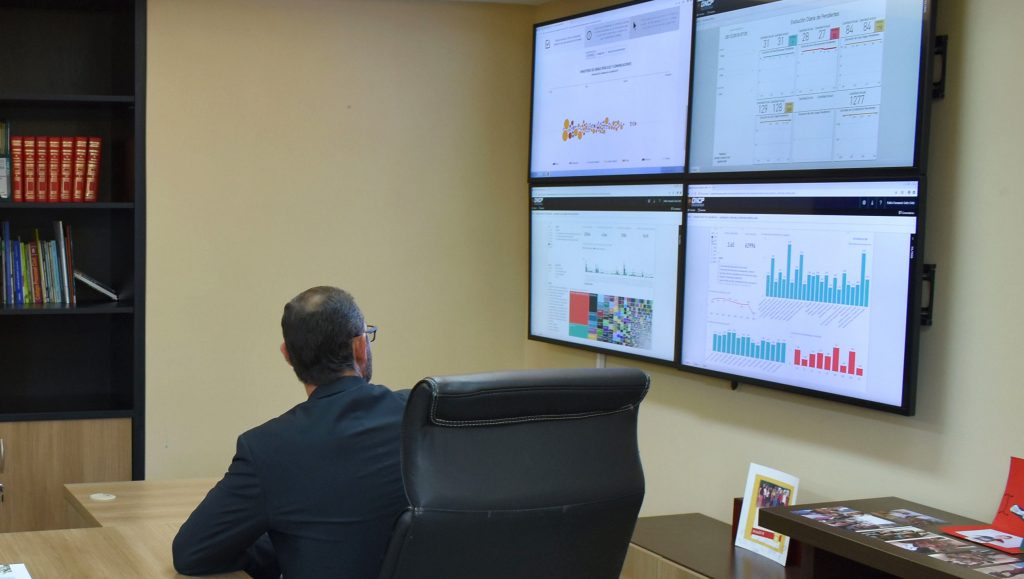
But this was not the only one regulation. For a long time, questions have been raised over how reference prices that serve as a guide for governments to ensure a fair amount were obtained. “Reference prices have always been published but there has never been any information published about the analysis that went into the calculation of the reference price,” says Juan Ardissone, head of Information Technology at the DNCP. The pandemic exposed this and other systemic deficiencies and helped change the system. So, not long after the emergency procurement began as stories about overpriced “golden” purchases of critical goods were exposed, the agency issued a regulation requiring institutions not only to publish the reference prices obtained on the market but also to explain how they arrived at those figures.
Making public how these prices were calculated was not the only change. Tenderers were also required to provide at least three prices and two data sources (for example, previous contracts and budgets). Ardissone points out that because of this requirement, agencies not only approached their usual suppliers for a quote but also cast their nets wider to seek quotes from all suppliers of the goods in question.
The regulations meant that new tools could be created to speed up buying processes. The DNCP launched an “online store”. Open data was crucial in this process so that the national procurement agency could identify what public institutions were buying.
In the online store, agencies could see the products available all in one place, add them to a cart, and issue a purchase order. “We focused on having the largest number of bidders in the store and the results were very interesting because prices started to plummet. For example: a mask bought outside of the store at the beginning of the pandemic cost around US$1 (7,000 guaraníes). As we started to add more and more suppliers and competition intensified, the price of masks fell to 700 guaraníes,” explains Vázquez.
Agencies were able to purchase their goods faster because there was no need to write tender specifications or receive and assess bids. Ardissone explains that the system enables public institutions to “complete their procurement processes within 3 days as opposed to 3 weeks”.
The new regulations, the launch of the online store, and public monitoring have been instrumental in bringing down the number of direct purchasing processes. An Open Contracting Partnership analysis into open data in buying processes between March 1 and December 31, 2020 shows that in May, 94% of pandemic-related purchases were obtained directly but that figure had dropped to 24% by December.
Examining a total of 262 processes labeled as “Covid-19” or related to Covid, the analysis also shows a substantial increase in the publication of reference prices associated with each process. The figures for May show that just 6% of contracts provided that information, whereas this figure had risen to 100% by last December. In the final months of 2020, direct procurement procedures fell substantially and amendments were made to only 8% of contracts.
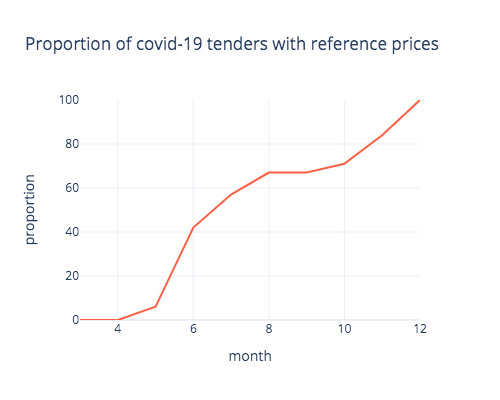
Open data, major players: citizen oversight, journalistic investigations and new monitoring tools
Publishing open procurement data was instrumental in helping journalists and citizens to monitor the buying processes taking place during the pandemic. Within a matter of days, traffic to the DNCP website rocketed reflecting public interest in the goods that the government was buying and the prices being paid.
For Riveros García, this caused a “boom” in public oversight of government procurement: “Ordinary people started taking screenshots of procurement data, which led to calls for certain tenders being canceled as a result of public pressure or processes being halted. In one case a supplier was suspended from tendering for 18 months.”
Ordinary people started taking screenshots of procurement data, which led to calls for certain tenders being canceled as a result of public pressure or processes being halted.
“The public started to detect irregularities early on and these were reported in the media. They helped us monitor public procurement. In some cases, the scrutiny led to resignations of the highest authorities involved,” explains Vazquez.
Open data analysis and citizen oversight have given rise to new monitoring tools and helped to detect irregularities which were previously hidden among the mass of information available about procurement processes.
The scandal over the purchasing of bottles of tonic water: the media revealed that the Paraguayan national oil company (Petropar) had bought 5,000 bottles of tonic water from Solumedic SA for 359,700,000 guaraníes (US$ 52,000) via emergency regulations. The incident was widely reported on other media channels and, following an investigation by Paraguay’s Public Prosecutor’s Office, brought about the resignation of Patricia Samudio, the company’s president. Months later, the former president and 21 officials went on trial.
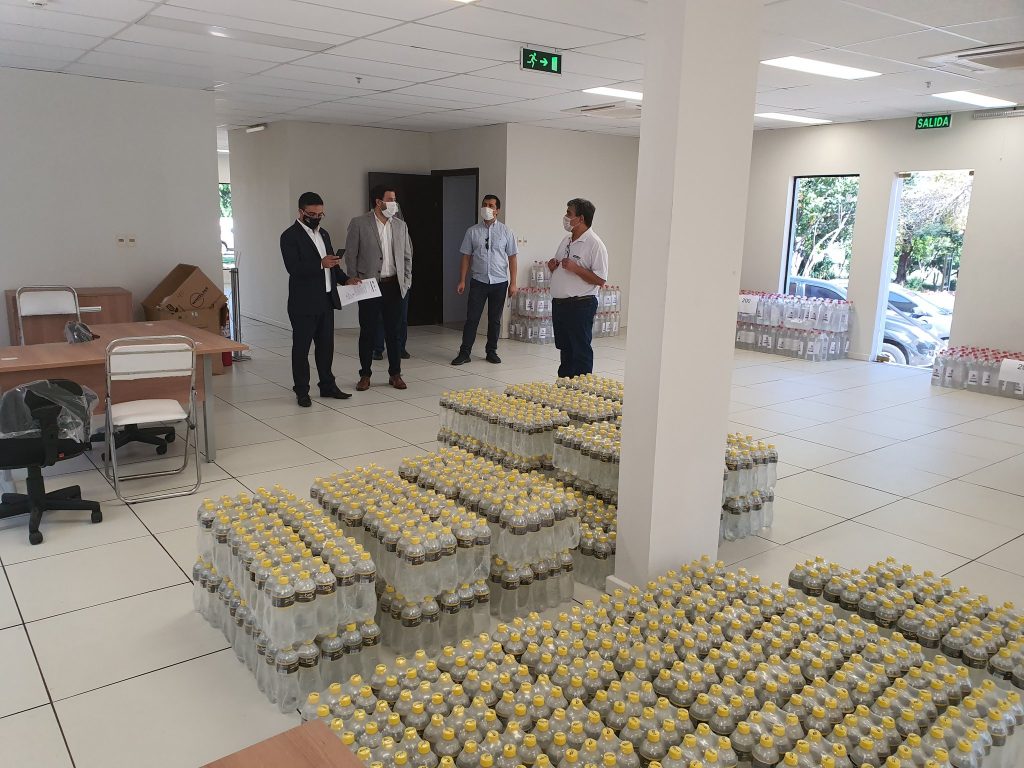
ReAcción’s investigations: information scrutiny was not just about national procurement procedures. reAcción, with financial support by the Environmental Law and Economics Institute (IDEA), started to monitor COVID-19 emergency processes in Ciudad del Este and neighboring municipalities. They initially focused on analyzing procurement processes labeled as COVID-19 and discovered that the ability to categorize the process manually was in some cases being exploited to hasten procedures that had nothing to do with the coronavirus. In other cases the COVID-19 label was omitted or was simply not used in order to “circumvent public oversight”.
So they started to look at each purchase individually. One of the team’s main findings was that procurement processes were often being opened and closed in the blink of an eye: “Bids of more than one or two million dollars were being submitted within less than 24 hours,” recalls Riveros Garcia. They also compared the prices paid by municipalities for 7 food basket items (noodles, yerba mate, rice, table salt, flour, sugar and vegetable oil) with the respective selling prices in supermarkets and found that only 2 of the 7 items were being supplied at a lower price than the supermarket retail price.
ReAcción also organized a series of workshops and training courses on empowerment and capacity-building for journalists, activists, and the general public.
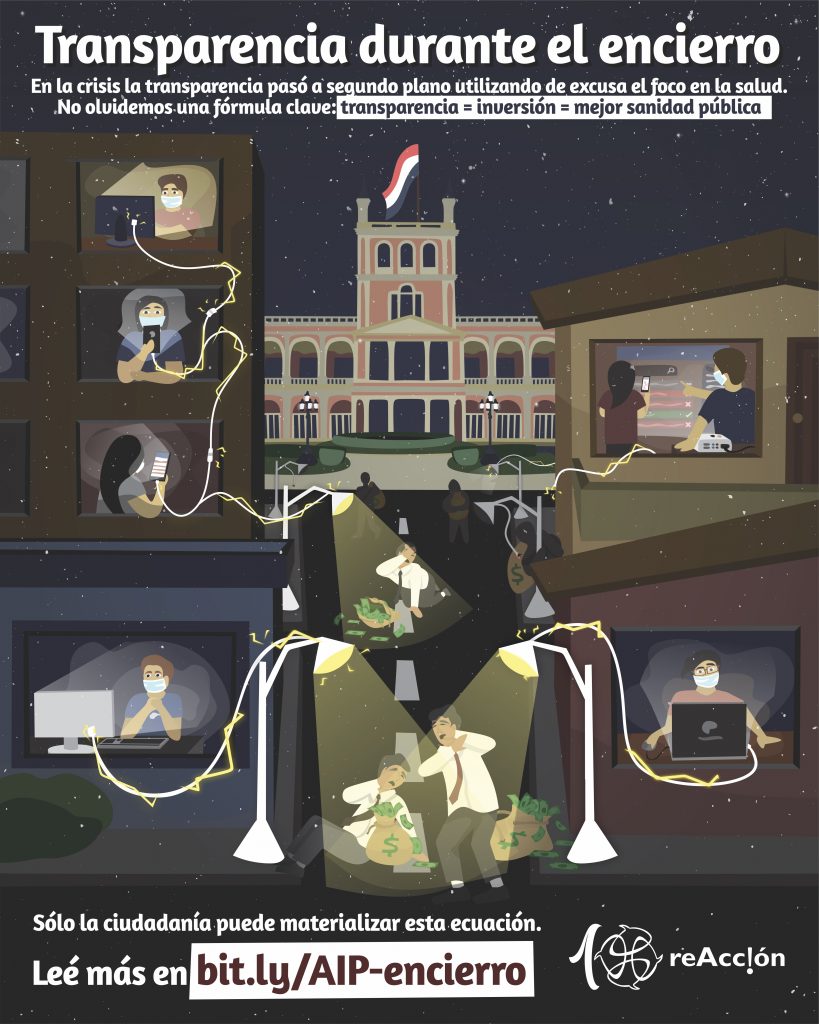
New monitoring platforms: Civil society organizations and experts have used open data to create their own procurement dashboard and to monitor processes more closely. The Center for Sustainable Development (CDS) and IDEA, supported by reAcción, Seeds for Democracy, and Open Contracting Partnership, created the website “Control Ciudadano”, which analyzes procurement and emergency public funds during the pandemic. Yohanna Lisnichuk, a software engineer who worked on the website, explains that the analyses were focused on a series of questions such as “whether items purchased during the pandemic were more expensive; what items were being bought under processes labeled as COVID-related, which suppliers were supplying those items, which public agencies were buying the items, which were the biggest tenders, and whether the chosen suppliers had any links with any process labeled as COVID”.
Among the major findings of their work was that companies shared addresses or were awarded contracts under different names. This was the case of the two companies that were awarded the largest contracts related to pandemic procurement.
Besides information about procurement, the site also includes various sources of information, including sworn statements by elected officials, information about recipients of subsidies during the pandemic and public official payrolls.
Alerts for public officials and suppliers: the national procurement agency has set up a system of notifications to ensure that COVID-related calls for tenders are compliant. For example, the alert system checks the contract amounts and ensures compliance with the publicity periods specified. As soon as a tender is published which contains provisions contrary to the regulations, a notification is automatically sent to the head of the inspectorate’s cell phone indicating that a contract has been published that contains something contrary to the regulation.
The notification system is also useful for suppliers. Whenever an agency starts a procurement process to buy supplies for the pandemic, suppliers receive an alert from the system, including in cases of direct procurement in which processes are shorter due to the urgency of the pandemic.
Despite this further improvement, challenges around competition in procurement processes remain. The DNCP has used the open data to assess levels of competition within procurement processes. Despite a positive response to the measures adopted, the agency found that the level of supplier participation in 2020 was low. The DNCP accounts this to the increased amount of emergency procedures that require less publicity. As a response, the DNCP plans to issue a regulation forcing institutions to extend bidding periods in cases where there is only one participant.
The platform Rindiendo Cuentas
The Paraguayan government also took advantage of the country’s open data ecosystem to launch the rindiendocuentas.org.py platform in partnership with the Inter-American Development Bank in late April 2020. The site is a one-stop-shop for information about donations, salaries and distribution of emergency resources generally during the COVID-19 pandemic. Thanks to its availability in the Open Contracting Data Standard, it was possible to add information about emergency contracts easily and quickly.
The site offers numerous functionalities, including the option to make public information requests, report irregularities, submit queries, leave recommendations and lodge complaints.
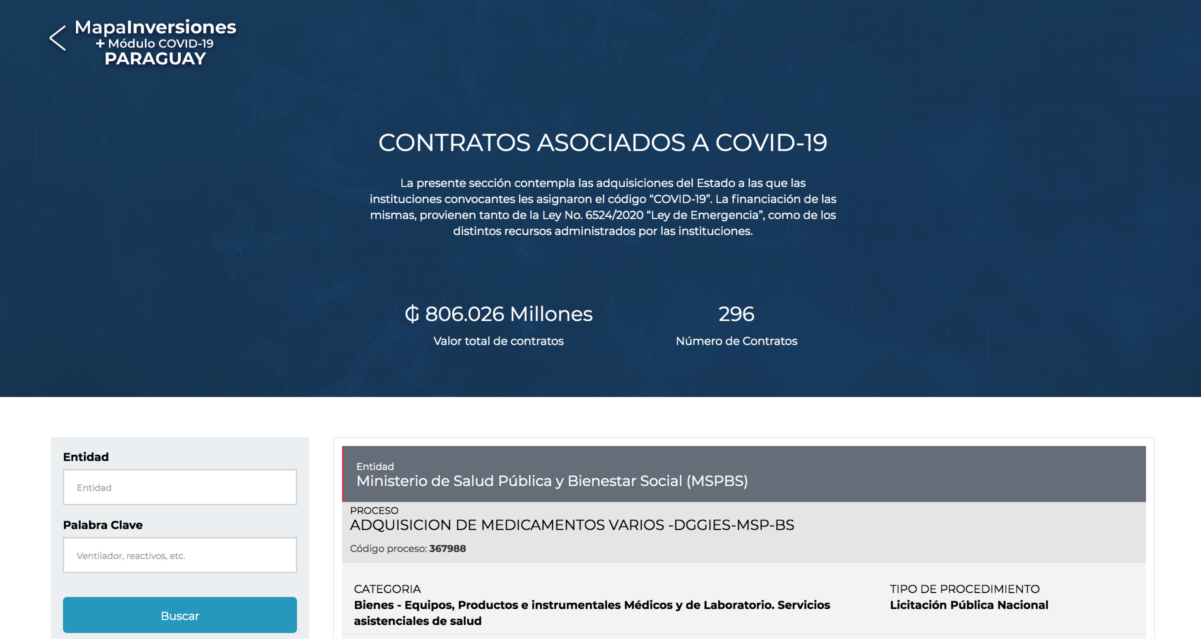
The call for accountability
The DNCP’s swift response in Paraguay, together with the culture of openness in procurement, means that there are numerous starting points to monitor emergency public buying, both within and outside of government.
But it is not without its challenges. “No-one has gone to jail, no-one has been penalized. The most that this whole process has achieved has been to bring about the resignation of procurement managers. This is the great danger of this great push for transparency during the pandemic. It takes away your sense of acting as civil society and as a citizen,” says Riveros Garcia.
The work achieved by the DNCP and its strategy have been vital in ensuring that activists and civil society have had access to the information that has been generated in the public procurement system as the pandemic has evolved. It is equally important to ensure that changes to the procurement system must be accompanied by other structural changes that will enable thorough investigations to take place, thereby discouraging further irregularities or cases of corruption.
More sophisticated tools to support the daily procurement tracking are emerging. For example: the partnership that created the Control Ciudadano platform together with the Latin American Open Data Initiative (ILDA) combined artificial intelligence and procurement data to create a bot that uses open procurement information and publishes any calls for tenders that do not follow the behavior established in the rules.
This and other innovative forms of monitoring and teamwork show that the public will not give up the fight easily. After all, someone has fix the system and civil society in Paraguay has much that is required: better data and information wedded to the perseverance and determination needed to make a difference.
We will be there to support and cheer their next steps to close the accountability gap and to build back better.